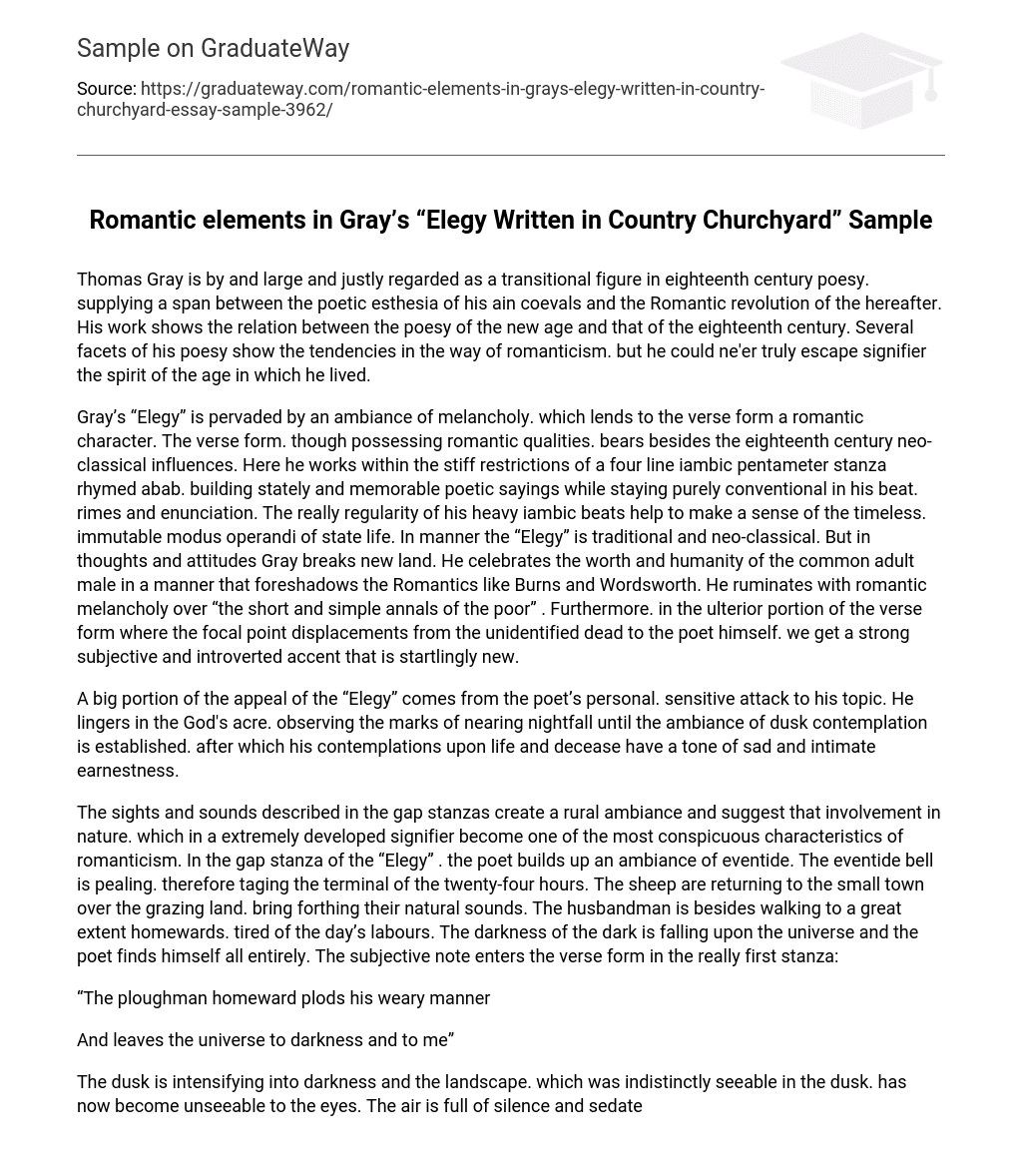Thomas Gray is by and large and justly regarded as a transitional figure in eighteenth century poesy. supplying a span between the poetic esthesia of his ain coevals and the Romantic revolution of the hereafter. His work shows the relation between the poesy of the new age and that of the eighteenth century. Several facets of his poesy show the tendencies in the way of romanticism. but he could ne’er truly escape signifier the spirit of the age in which he lived.
Gray’s “Elegy” is pervaded by an ambiance of melancholy. which lends to the verse form a romantic character. The verse form. though possessing romantic qualities. bears besides the eighteenth century neo-classical influences. Here he works within the stiff restrictions of a four line iambic pentameter stanza rhymed abab. building stately and memorable poetic sayings while staying purely conventional in his beat. rimes and enunciation. The really regularity of his heavy iambic beats help to make a sense of the timeless. immutable modus operandi of state life. In manner the “Elegy” is traditional and neo-classical. But in thoughts and attitudes Gray breaks new land. He celebrates the worth and humanity of the common adult male in a manner that foreshadows the Romantics like Burns and Wordsworth. He ruminates with romantic melancholy over “the short and simple annals of the poor” . Furthermore. in the ulterior portion of the verse form where the focal point displacements from the unidentified dead to the poet himself. we get a strong subjective and introverted accent that is startlingly new.
A big portion of the appeal of the “Elegy” comes from the poet’s personal. sensitive attack to his topic. He lingers in the God’s acre. observing the marks of nearing nightfall until the ambiance of dusk contemplation is established. after which his contemplations upon life and decease have a tone of sad and intimate earnestness.
The sights and sounds described in the gap stanzas create a rural ambiance and suggest that involvement in nature. which in a extremely developed signifier become one of the most conspicuous characteristics of romanticism. In the gap stanza of the “Elegy” . the poet builds up an ambiance of eventide. The eventide bell is pealing. therefore taging the terminal of the twenty-four hours. The sheep are returning to the small town over the grazing land. bring forthing their natural sounds. The husbandman is besides walking to a great extent homewards. tired of the day’s labours. The darkness of the dark is falling upon the universe and the poet finds himself all entirely. The subjective note enters the verse form in the really first stanza:
“The ploughman homeward plods his weary manner
And leaves the universe to darkness and to me”
The dusk is intensifying into darkness and the landscape. which was indistinctly seeable in the dusk. has now become unseeable to the eyes. The air is full of silence and sedateness. The lone hearable sounds are the dull. humming sound of the beetle. which is winging approximately in circles and the tinkling of bells round the cervixs of sheep that are easy falling asleep in their distant creases. Another sound that can be heard is the occasional hooting of the glooming and alone bird of Minerva. which cries whenever it is disturbed by some unfriendly animal. as if the bird of Minerva were kicking to the Moon about undue intervention with its privateness in the church-tower where it has ever been an unchallenged sovereign.
The irrevokable nature of decease. the extinction of gifts and abilities. which ne’er found a opportunity to uncover to themselves. the poet’s expectancy of his ain decease are all full of poignancy. The elegiac. brooding tone is sustained throughout a assortment of bends in the idea. It is in the tradition of cemetery contemplation. but here the handling of the scene and the development of the speculation is done with high art.
Thereafter. the verse form becomes impersonal. and the personal component re-appears towards the terminal. The personal mention. so. becomes more apparent in the shutting lines. The listless young person. mumbling his wayward illusions in purdah and deceasing immature. is in the first topographic point Richard West who like Milton’s Lycidas cherished poetic aspirations that were frustrated by an early decease. He is Grey himself. besides ambitious. hypochondriac and unhappy and likely plenty to come to a similar terminal. In its acknowledgment of the self-respect of simple lives lived near to the dirt and in its understanding with their destiny. the “Elegy” looks frontward to the human-centered enthusiasm. which marked the stages of romantic poesy. The verse form is. so. steeped in melancholy. The verse form is an lament non merely on the decease of the low villagers who lie buried in the God’s acre. but besides. toward the stopping point. an lament on the poet’s ain decease. The verse form is non written in the favourite metre of the eighteenth century. viz. the heroic pair. The poet employs a simple and slow moving stanza for. which he handles with great accomplishment.
A big portion of the “Elegy’s” entreaty and illustriousness prevarications. of class. in it’s smoothly and meticulously shaped phrasing. This verse form is an early symptom of discontent with the Augustan orthodoxy. It is early effort to set up a freer and wider usage of poetic linguistic communication. It provides in a sense the starting point for the Wordsworthian revolution.





